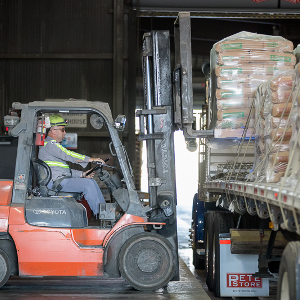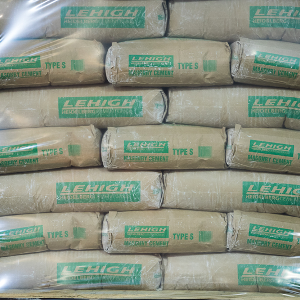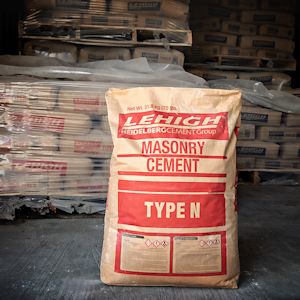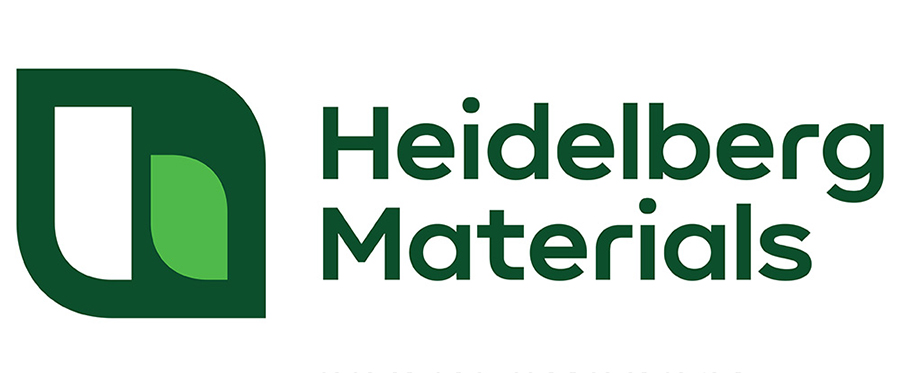Proportioned and packaged under laboratory-controlled conditions, Lehigh masonry cements take the guesswork out of mortar mixing and ensure consistent results from batch to batch, project to project.
Lehigh masonry cement products fit any application or need: masonry cement, mortar cement, portland cement-lime, white masonry cement and colored masonry cement.
At their simplest, masonry cements are a mixture of portland or blended cement and a plasticizing material, such as hydrated lime, which retains water and lends "workability" to the mortar mix – a measure of ease of use for masons. Other components enhance key properties, such as setting time, durability, strength, water resistance and color.
Masonry cement is mixed with sand and water to produce mortar for brick, block and stone construction. Mortar is the bonding agent that forms individual masonry units into a wall. Other applications include stucco and cement-based plasters.

Most masonry cements are preblended, ready to be mixed with sand and water at the job site. Premixed masonry cements offer consistent and uniform performance. Convenience is also a factor.
An alternative is to mix all the individual ingredients – cement, lime, sand and water – at the job site.
The American Society for Testing and Materials (ASTM) designates both mortars and the masonry cement used to produce them by types, which are primarily based on strength.
Traditionally, alternating letters of the words "mason work" became the letters used for five types of mortar: MaSoN wOrK, with Type M being the strongest and Type K the weakest.
ASTM now designates three types of mortar: Type M, Type S and Type N. Types O and K are no longer common in construction and are used primarily for restoration of historic masonry structures.
Type N is for general use in most mortar and stucco applications. Types M and S are specified when higher strength is required in load-bearing or below-grade walls.

Masonry cement Types N, S and M are covered by ASTM C91, Standard Specification for Masonry Cements.
Mortar cement is covered by ASTM C1329, Standard Specification for Mortar Cement.
Mortar must conform to ASTM C270, Standard Specification for Mortar for Unit Masonry.
Masonry cement consists of portland or blended cement, plasticizers, and an air entraining agent. Air-entraining agents protect mortar from freeze-thaw damage and provide additional workability. The specific components of masonry cement may vary depending on the manufacturer and local construction practices. ASTM C91 defines masonry cement by physical requirements and performance properties rather than ingredients.
Mortar cement, a relatively new designation, was developed for demanding structural applications and features higher strength and lower air content than masonry cement. It is the only cement for mortar that must meet a minimum bond strength. For that reason, it conforms to a separate ASTM designation, C1329, Standard Specification for Mortar Cement.
Cement-lime masonry cement consists of portland cement and hydrated lime. The lime serves as a plasticizer. Cement/lime blends in Types N, S and M are covered by ASTM C270 only, Standard Specification for Mortar for Unit Masonry, since the two components, portland cement and lime, are each covered by their respective specifications: ASTM C150, Standard Specification for Portland Cement, and ASTM C207, Standard Specification for Hydrated Lime for Masonry Purposes.
For consistency and convenience, most portland-lime blends are premixed and added to sand and water at the job site to produce mortar. However, some contractors prefer to mix all ingredients at the job site.
White mortar is made with either white masonry cement or with a blend of white portland cement and lime. White portland cement used for masonry should meet the same ASTM specifications as its gray counterpart.
White masonry cement should meet the requirements of ASTM C91 for Type N, S or M masonry cement. White mortar can also serve as a medium for colored mortars and produces cleaner, brighter colors than grey mortar.
Colored masonry cement is premixed with pigments to offer a wide range of color. Because they are produced under highly controlled conditions, colored masonry cements ensure consistent color throughout the project. Lehigh’s high-quality pigments produce color-fast mortar that resists fading from ultraviolet rays and weathering.

NCMA Solutions Center,TEK documents, building codes and specifications
http://ncma-br.org/lehighhanson
ASTM C91, Standard Specification for Masonry Cements
https://www.astm.org/Standards/C91.htm
ASTM C1329, Standard Specification for Mortar Cements
https://www.astm.org/Standards/C1329.htm
ASTM C270, Standard Specification for Mortar for Unit Masonry
https://www.astm.org/Standards/C270.htm
The Brick Industry Association
http://www.gobrick.com/

